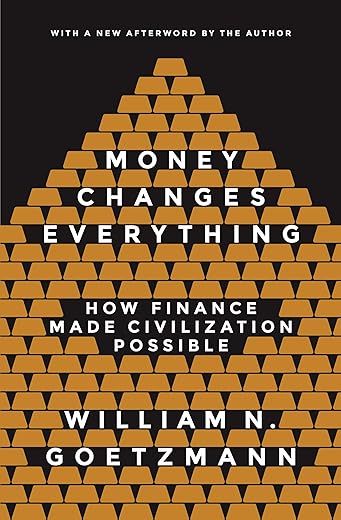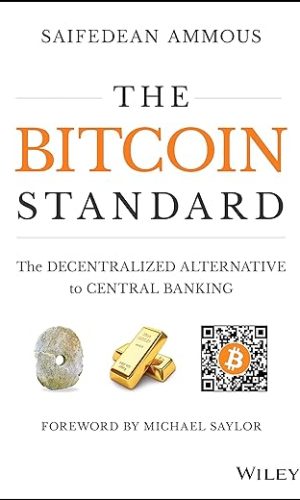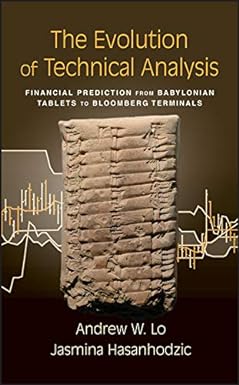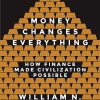Money Changes Everything: How Finance Made Civilization Possible
£11.10
“[A] magnificent history of money and finance.”—New York Times Book Review
“Convincingly makes the case that finance is a change-maker of change-makers.”—Financial Times
In the aftermath of recent financial crises, it’s easy to see finance as a wrecking ball: something that destroys fortunes and jobs, and undermines governments and banks. In Money Changes Everything, leading financial historian William Goetzmann argues the exact opposite—that the development of finance has made the growth of civilizations possible. Goetzmann explains that finance is a time machine, a technology that allows us to move value forward and backward through time; and that this innovation has changed the very way we think about and plan for the future. He shows how finance was present at key moments in history: driving the invention of writing in ancient Mesopotamia, spurring the classical civilizations of Greece and Rome to become great empires, determining the rise and fall of dynasties in imperial China, and underwriting the trade expeditions that led Europeans to the New World. He also demonstrates how the apparatus we associate with a modern economy—stock markets, lines of credit, complex financial products, and international trade—were repeatedly developed, forgotten, and reinvented over the course of human history.
Exploring the critical role of finance over the millennia, and around the world, Goetzmann details how wondrous financial technologies and institutions—money, bonds, banks, corporations, and more—have helped urban centers to expand and cultures to flourish. And it’s not done reshaping our lives, as Goetzmann considers the challenges we face in the future, such as how to use the power of finance to care for an aging and expanding population.
Money Changes Everything presents a fascinating look into the way that finance has steered the course of history.
Read more
Additional information
| Publisher | Princeton University Press, Revised edition (15 Aug. 2017) |
|---|---|
| Language | English |
| File size | 21243 KB |
| Text-to-Speech | Enabled |
| Enhanced typesetting | Enabled |
| X-Ray | Not Enabled |
| Word Wise | Enabled |
| Sticky notes | On Kindle Scribe |
| Print length | 593 pages |









by Jay
Great book–a bit long, but excellent analysis. A shorter more stylized version would likely be more appealing tot he causal reader.
by William Jordan
A long – very long – book setting out the history of financial innovation across many different societies, moving through ancient Mesopotamia, onto Greece and Rome, then by way of China to Europe and finally the US. The theme is that financial systems become necessary as cities start to develop and later states. Systems are needed to regulate interpersonal contacts among people whose only contact is through business and commerce.
I learned a great deal from this book. The author believes that in at least some societies literacy develops to help people manage their accounts and financial transactions. That joint ventures, debt (and the slavery or bondage that goes with a failure to repay debt or can arise from reparations following war) soon evolve as societies start to trade. Financial literacy is well spread in Ancient Greece, where large numbers of ordinary citizens form the jury to hear the kind of complex financial cases that Demosthenes argued. China is notable for the initial invention of paper money and for a financial system in which the state and a state-run bureaucracy plays a leading role. Meanwhile in Europe public debt originates when Venice needs to raise large sums of money in a hurry. And various forms of banking are in evidence in many societies, including the Knights Templar, who are the stopping off points for crusaders. In due course, companies limited by guarantee are formed; then stock markets and stock market bubbles – and regulation. Later innovations are the IMF and the World Bank, both of which we owe to Keynes, and which stop sovereign debt leading to wars and the impounding of the goods of a debtor nation. Meanwhile there are varieties of theories about how best to invest, as risk comes to be better understood.
There’s much to learn; and much to think about. But I did find it took me quite a long time to read it.
by Ivan Cohen
One of the finest books on the history and development of money ever published. This book is a triumph of scholarship, yet remains an easy and engaging read. Fabulous.
by Mental Health Professional
Written by an archaeologist and accountant, it starts well with ancient finance and loses momentum as it moves across the milenia. It is very informative though.
by jonny a
thorough, engaging, well-written and very informative. its much better than the other “history of money” type books out there. even for someone who is not well-versed on the topic, its an enlightening look at the link between the evolution of finance, and the evolution of culture it helped to propel forward. highly recommend.
by de Ruiter, Y.M.
excellent!
by Vegan tendencies
This is an incredibly incredibly detailed book about the history of finance. If you want detail, it’s here.
It’s also a very breathless book, which spends all its time up close to its subject, describing what happened with regards to particular people in particular places at particular times. There’s not much contemplation or perspective: it’s a brain dump, a collection of vignettes, shifting from one scene to the next. This needed some heavy editing and additional work to put the specifics in context.
Lastly: the title is misleading. It would be more apt to call this book: “A very long history of finance.” There’s not really much effort to show how finance let to large societal changes.
by airman
no comments